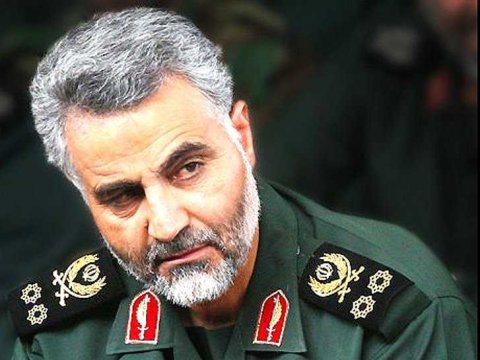
Backed by allied Shiite, Sunni and Iranian fighters, Iraqi security forces launched a large-scale military operation Monday to recapture Saddam Hussein’s hometown from the Islamic State extremist group, a major step in a campaign to reclaim territory in northern Iraq controlled by the militants.
But hours into the operation, a key test for the embattled Iraqi army, the military said it still hadn’t entered the city of Tikrit, indicating a long battle lies ahead.
State-run Al-Iraqiya television said that forces were attacking Tikrit from different directions, backed by artillery and airstrikes by Iraqi fighter jets. It said the militants were dislodged from some areas outside the city. Several hours into the operation, it gave no additional details.
The military commander of Salahuddin region, Gen. Abdul-Wahab al-Saadi, told state TV the operation was “going on as planned,” with fighting taking place outside Tikrit mainly on its eastern side.
“Until this moment we have not entered the city,” al-Saadi said. “God willing, we will enter, but we need some time as planned. … God willing, victory will be achieved and Salahuddin will be turned into a grave for all terrorist groups.”
Tikrit, the provincial capital of Salauhddin province, 130 kilometers (80 miles) north of Baghdad, fell to the Islamic State group last summer, along with the country’s second-largest city of Mosul and other areas in the country’s Sunni heartland.
Tikrit is one of the largest cities held by Islamic State militants and lies on the road connecting Baghdad to Mosul. Retaking it will help Iraqi forces have a major supply link for any future operation to retake Mosul.
U.S. military officials have said a coordinated military mission to retake Mosul will likely begin in April or May and involve up to 25,000 Iraqi troops. But the Americans have cautioned that if the Iraqis aren’t ready, the offensive could be delayed.
The U.S.-led coalition launching airstrikes targeting the Islamic State group were not involved in the Tikrit operation, Iraqi officials said. American officials had no immediate comment.
Past attempts to retake Tikrit have failed, however, as Iraq struggles with its armed forces, which collapsed in the wake of the Islamic State group’s offensive last summer.
Iraqi forces battling near Tikrit also apparently have the help of Iranian Gen.Qassem Suleimani, the commander of the elite Revolutionary Guard’s Quds Force, who arrived there two days ago, the Iranian semi-official Fars news agency reported.
The powerful general has emerged as the chief tactician in Iraq’s fight against the Sunni militants, working on the front lines alongside dozens of advisers from his country’s Revolutionary Guard to direct Shiite militiamen and government forces in the smallest details of some battles.
Fars also reported drones were flying over Tikrit, without identifying whether the drones were Iranian or Iraqi.
Hours after the offensive began, the U.N. special envoy in Iraq appealed to warring groups to avoid attacking civilians.
“Military operations reinforced by international and Iraqi air support must be conducted with the utmost care to avoid civilian casualties, and with full respect for fundamental human rights principles and humanitarian law,” Nickolay Mladenov said in a statement.
Monday afternoon, a gasoline tanker rigged with a bomb exploded as soldiers and Shiite militiamen tried to dismantle it in the village of al-Jalam south of Tikrit, killing seven troops and wounding 15, police and hospital officials said.
Al-Jalam, a farming area that has been a stronghold of Sunni militants, is located outside the Sunni city of Samarra, 95 kilometers (60 miles) north of Baghdad. All officials spoke on condition of anonymity because they were not authorized to speak to journalists.
Tikrit is an important test case for Iraq’s Shiite-led government, which is trying to reassert authority over the divided country. Islamic State fighters have a strong presence in the city and are expected to put up fierce resistance.
The offensive comes as momentum has begun to shift since Iraqi soldiers, backed by airstrikes from a U.S.-led coalition, took back the nearby refinery town of Beiji in November. Any operation to take Mosul would require Iraq to seize Tikrit first because of its strategic location for military enforcements.
Iraq is bitterly split between minority Sunnis, who were an important base of support for Saddam, and the Shiite majority. Since Saddam was toppled in a U.S.-led invasion in 2003, the Sunni minority has felt increasingly marginalized by the Shiite-led government in Baghdad, and in 2006 long-running tensions boiled over into sectarian violence that claimed tens of thousands of lives.
While the TV said Shiite and Sunni tribal fighters were cooperating in Monday’s offensive, Tikrit is an important Sunni stronghold, and the presence of Shiite forces risks could prompt a backlash among Sunnis. The Iraqi military is heavily dependent on Shiite militias that have been accused of abusing Sunni communities elsewhere in Iraq.
Ahead of the operation, Prime Minister Haider al-Abadi, a Shiite, called on Sunni tribal fighters to abandon the Islamic State extremist group, offering what he described as “the last chance” and promising them a pardon.
“I call upon those who have been misled or committed a mistake to lay down arms and join their people and security forces in order to liberate their cities,” al-Abadi said Sunday during a news conference in Samarra.
His comments appeared to be targeting former members of Iraq’s outlawed Baath party, loyalists to Saddam, who joined the Islamic State group during its offensive, as well as other Sunnis who were dissatisfied with Baghdad’s Shiite-led government.
Saddam, whose Sunni-dominated government ruled the country for some two decades, was executed after his ouster. Tikrit frequently saw attacks on U.S. forces during the American occupation of the country.
My Way/ Associated Press

Leave a Reply
You must be logged in to post a comment.